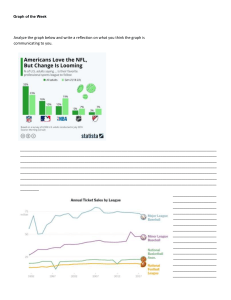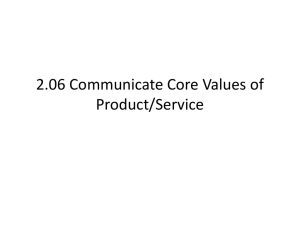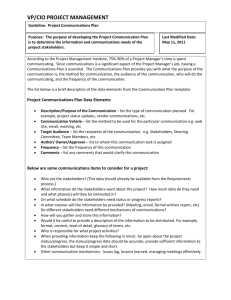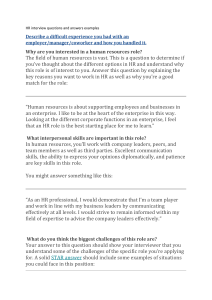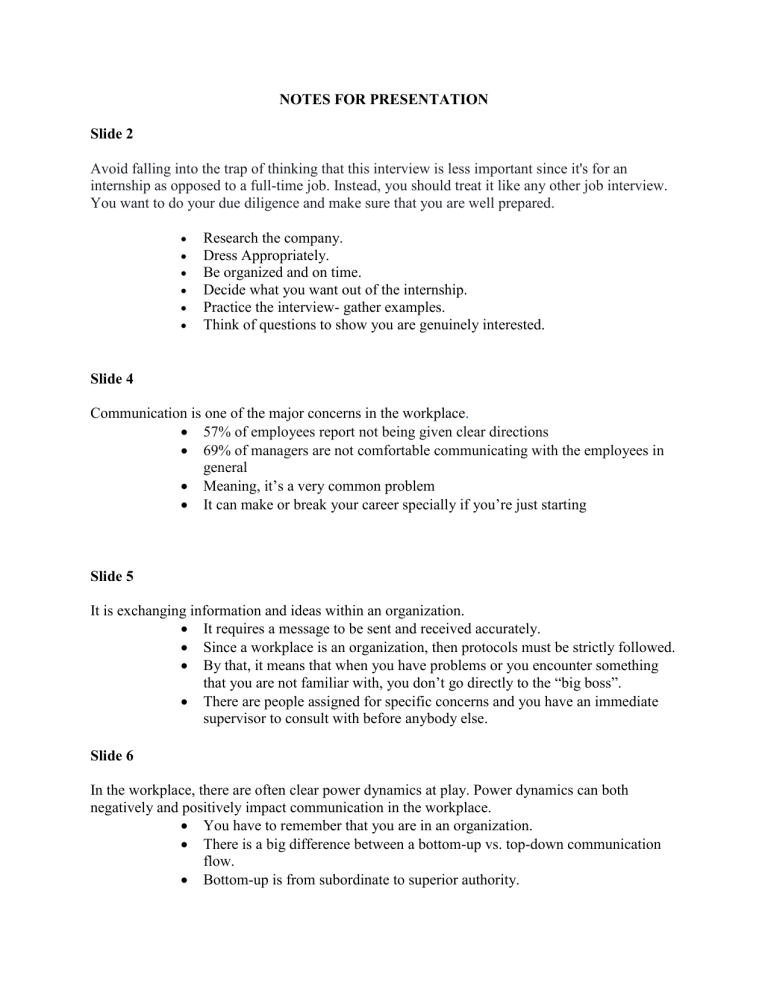
NOTES FOR PRESENTATION Slide 2 Avoid falling into the trap of thinking that this interview is less important since it's for an internship as opposed to a full-time job. Instead, you should treat it like any other job interview. You want to do your due diligence and make sure that you are well prepared. Research the company. Dress Appropriately. Be organized and on time. Decide what you want out of the internship. Practice the interview- gather examples. Think of questions to show you are genuinely interested. Slide 4 Communication is one of the major concerns in the workplace. 57% of employees report not being given clear directions 69% of managers are not comfortable communicating with the employees in general Meaning, it’s a very common problem It can make or break your career specially if you’re just starting Slide 5 It is exchanging information and ideas within an organization. It requires a message to be sent and received accurately. Since a workplace is an organization, then protocols must be strictly followed. By that, it means that when you have problems or you encounter something that you are not familiar with, you don’t go directly to the “big boss”. There are people assigned for specific concerns and you have an immediate supervisor to consult with before anybody else. Slide 6 In the workplace, there are often clear power dynamics at play. Power dynamics can both negatively and positively impact communication in the workplace. You have to remember that you are in an organization. There is a big difference between a bottom-up vs. top-down communication flow. Bottom-up is from subordinate to superior authority. Top-down is from superior to subordinate. They differ in the type of language we use. The choice of words when we send a message. Slide 7 Communicating properly helps you avoid confusion, provides purpose, builds a positive company culture, and creates accountability. You will know and understand your job and what you need to do about it and the scope and limitations of the tasks given. Slide 8 Follow the 7 C's of Communication (Principles of Communication) 1. Concrete- Solid argument based on factual materials (data, figures etc.) 2. Coherent- Logical, well organized 3. Clarity-purpose or goal is clear. 4. Commitment- agree or disagree, own your words 5. Consistency- words shouldn’t confuse 6. Completeness- People shouldn’t be left wondering. 7. Courteous- Let’s keep it positive. Your argument should encourage the other person to be respectful. Slide 9-10 There are 2 sources of communication in a workplace Internal External Slide 11 Communicating with team members Communicating effectively with your team builds a happy and healthy workplace. Here are some tips: 1. Take responsibility and be a good example-Golden Rule 2. Adjust-Learn how to adjust depending on the personality of your team members. Their personalities will affect how they would respond and communicate. 3. Discuss communication issues-If there are problems in the workplace, talk directly to the ones involved. 4. Discuss rift among members-If your team members have personal issues with each other, try to help in resolving it by listening to everyone’s grievances. Make sure to apply your active listening and understanding skills. 5. Keep a tight agenda-Always know what to talk about and when to talk about these things. 6. Ask for questions from others- Check if things have been clear to everybody. Encourage them to ask questions and clarify instructions. Slide 12 Communicating with a Supervisor/Department Head Communicating with bosses, supervisors, and department heads can be challenging especially if you feel very inferior to them. However, communicating with them does not need to feel challenging or intimidating. Here are some tips to help you communicate with them effectively: Go straight to the point. Do not say unnecessary things. Respect their time. Show numbers and visual representations. When presenting numbers to your boss, do not just present them in paragraph forms. Schedule your appointment. Do not expect that they are always ready for an ambush talk. They are busy people and their time is precious. Prepare your agenda. Before speaking to your boss, plan what you need to say. Make a list. This will help you remember all your concerns. Be solution-focused. When consulting problems, always have a solution in mind. Slide 13 Communicating With Suppliers 1.) Specify what you want. 2.) Avoid jargon 3.) Talk as if they are customers-clearly, concisely, and politely. 4.) Put things in paper 5.) Communicate regularly-Follow -up Slide 14 Communicating with Trade Personnel Trade personnel are people skilled in a specific task. They provide services. Maintaining constant communication with them is very important especially when you depend on their services. Here are some tips to effectively communicating with trade personnel: 1. Be precise with what you want. Most trade personnel want to know what specific things they need to do for you. 2. Ask them how much time is needed to complete their tasks. 3. Ask them what other things you need to prepare in advance. 4. Do not be too demanding. Know their limitations. Slide 15 Communicating with Industry Bodies Communicating with industries and organizations can be both overwhelming and challenging. Here are several ways to reach industry bodies. 1. Reach them through email-Communicating through email gives a more formal appeal than communicating through phone. 2. Be updated on their newsletters and magazines-Knowing these things can be effective when building rapport with your industry partner. 3. Networking meetings-To talk to them personally, you can attend network meetings. This would be helpful especially if your concerns are urgent and need face-to-face communication. Slide 16 Communicating with Customers/Guests When employees are polite and are effective communicators, customers will most likely come back to avail services. Here are some points to remember: 1. 2. 3. 4. Establish a genuine relationship. Listen well. Use easy words, and not jargon when explaining complex topics. Address issues or misunderstanding immediately. Handling difficult situations will be unavoidable when you get to the industry. However, here are 3As that you should keep in mind should such occurrence occur. 1. Apologize. Immediately say sorry to the persons involved. 2. Attempt to solve the problem. 3. Alert your supervisor. Remember People have different perceptions. Don't send half-baked information. Bear in mind your goal of communicating. Communication is a two-way process. Be courteous always & always bear in mind that whatever you do, you carry with you the name of university. Protect our pride and make your alma mater proud.
